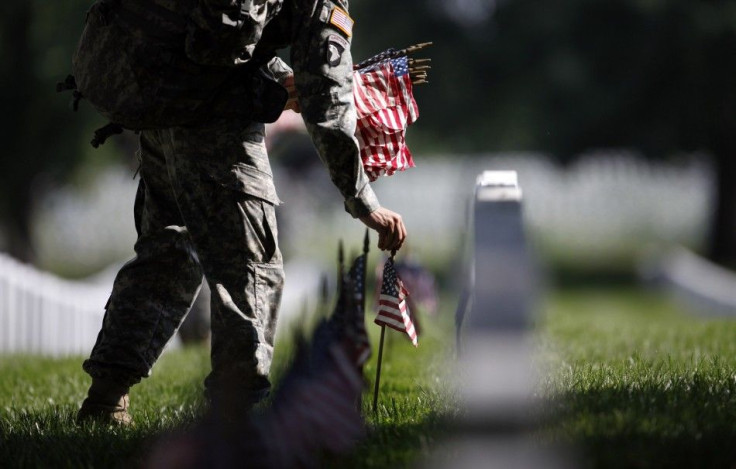US Military Suicides Hit Record High In 2012, Surpassing Combat Deaths

There was a record 349 suicides among U.S. military personnel, the third time in the last four years that deaths by suicide have exceeded combat deaths, according to a report from the Associated Press.
Suicides among active-duty troopers were up from 301 in 2011 and exceeded the U.S. Department of Defense's own internal projection of 325. Last year saw the highest number of military suicides since the Pentagon began tracking them in 2011, the AP reports, exceeding the estimated 295 Americans who died in Afghanistan in 2012.
The Army, the largest of the military branches, had the highest number of suicides among active-duty troops at 182. However, the Marine Corps, which has seen those numbers decline in the last two years, experienced 48 suicides -- a 50 percent jump from 2011.
The Air Force recorded 59 suicides, while the Navy had 60. The AP notes all of the reported numbers are tentative, pending the completion of formal pathology reports on each case later this year.
The rising number of servicemen taking their own life reportedly came as a surprise to many within the armed forces, considering the drawdown of U.S. forces from Iraq and the Obama administration’s commitment to pull out of Afghanistan by 2014. But David Rudd, a military suicide researcher at the University of Utah, said the nation may continue to see increases in those numbers, as more veterans come home suffering from depression, post-traumatic stress disorder or substance abuse issues.
The Army currently has a Suicide Prevention Program that instructs any soldier to direct a potentially suicidal service member to a behavioral health provider, chaplain or primary care provider.
Two retired Army generals, Peter W. Chiarelli and Dennis J. Reimer, discussed the dire need to reverse the skyrocketing trend of military suicides in an op-ed published by the Washington Post last month.
“Reversing this epidemic is among the military’s highest priorities. In that regard, one of the things we learned during our careers is that stress, guns and alcohol constitute a dangerous mixture. In the wrong proportions, they tend to blow out the lamp of the mind and cause irrational acts,” they wrote.
Asking troubled troops if they have a gun in their home is one of the most effective methods of suicide prevention, according to the authors. A provision added to the National Defense Authorization Act of 2013 gives military commanding officers or health professionals the ability to ask service members if they own a gun if they believe he or she is at risk of hurting himself or herself.
Firearms have by far been the most frequent method of death among military personnel who have taken their lives in recent years. Sixty-one percent of suicides among active duty males between 1998 to 2011 were committed using guns, according to the Armed Forces Health Surveillance Center, which notes firearms have been the preferred method by female troops as well.
© Copyright IBTimes 2024. All rights reserved.











